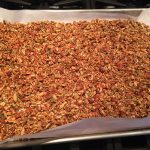The Common App: Get Those Words on That Page
 Amy Jin Johnson, an Essay Coach and Consultant with College Transitions, shares a few strategies for brainstorming and mapping your admission essay.
Amy Jin Johnson, an Essay Coach and Consultant with College Transitions, shares a few strategies for brainstorming and mapping your admission essay.
Tell a compelling story.
Rather than writing an analytical essay like you would for a class assignment, focus on telling a story. Most successful Common App essays provide the reader with a “slice of life” that grabs the reader’s attention with a dynamic narrative about a lived experience. Draw upon your creative writing skills to set the scene, provide vivid descriptions, and engage your reader with concrete details. If you don’t consider yourself a strong creative writer, it’s ok! You’re not setting out to write the great American novel. You’re writing a short essay that should read like you speak. It doesn’t have to be masterfully crafted, but it should tell an interesting story.
Write something! Write anything!
Nothing is more intimidating than the blank page, so the sooner that you can get something down on paper, the closer you are to writing an essay that expresses who you are and what’s important to you. During the brainstorming phase, don’t worry about writing in full sentences or paragraphs. Jot down some phrases, draw arrows between them, or doodle if you must! Your objective is simply to populate the page with whatever inspires you to write. Even if your notes read like complete nonsense, chances are they can be refined into something exceptional. Get those words on that page!
Don’t beat yourself up! These things take time.
Don’t expect to sit down and start typing the actual essay on your first day. Many students get disheartened when they hear their friends bragging about how they finished all of their essays in one afternoon. In my professional opinion, those friends are either fibbing or their essays aren’t very thoughtful – maybe both! While it may be true that some people can write multiple essays in one afternoon, most of us mere mortals require multiple rounds of outlining, drafting, and revision to produce ONE strong piece of writing. Don’t let anyone get in your head, and don’t believe for an instant that your writing speed reflects (a) your writing ability; (b) the quality of your work; or (c) the caliber of your application. I promise it doesn’t mean a thing! Work steadily at your own pace, and you’ll have no problems meeting the application deadlines.
Write down or record random thoughts.
I’d also suggest keeping a notebook or your phone handy over the next month or two so that if an idea hits you when you’re not sitting down to write you can save it for later. Sometimes our best stories come to us when we’re brushing our teeth or walking the dog. You can also record a voice memo or video if that’s easier. Whatever you need to do to capture that moment before it disappears into the ether!
Part 2 of this blog will focus on the writing process itself, so please stay tuned.
Amy Jin Johnson
. As a Ph.D. Candidate in American Studies and a former Teaching Fellow and Graduate Writing Center Associate at Brown University, she has successfully guided hundreds of undergraduate and graduate students to brainstorm writing topics, organize their thoughts, and improve their writing. After privately consulting on the admissions process intermittently for the last five years, she is thrilled to partner with College Transitions to bring her knowledge and expertise to college-bound students and their families.




















